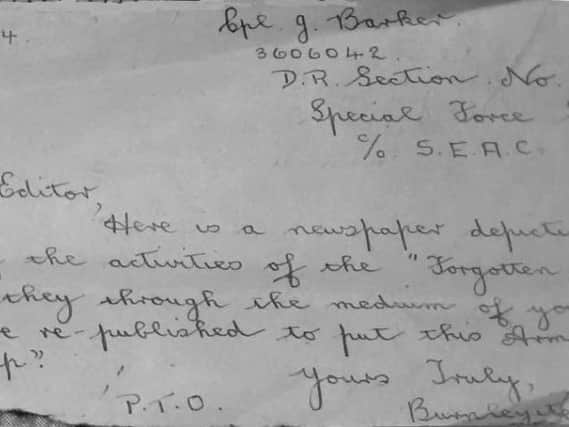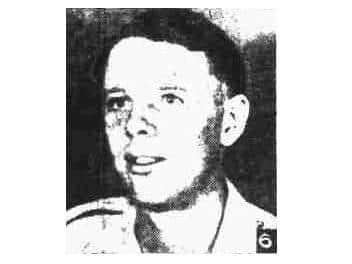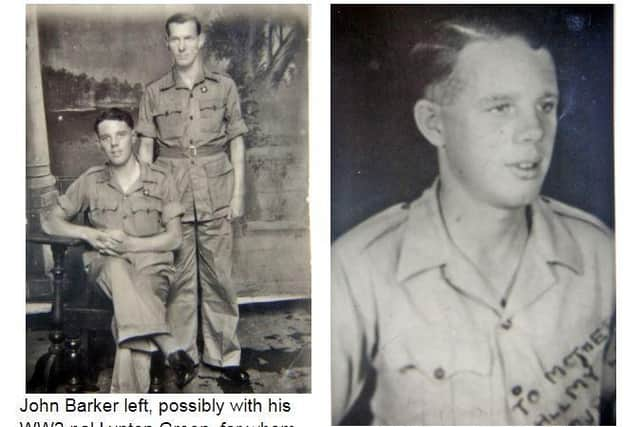A Wartime Souvenir: Forgotten story of Burnley WWII soldier revealed by lost 75-year-old letter


So began a fascinating tale dating back some 75 years.
The envelope was marked number 6594. Prying it open, Anne found a note inside dated November 27th, 1944 and addressed to the then-editor of the Express. It was from a Corporal John Barker. Hand-written on a scrap of brown paper in a beautiful hand, the note was affixed to a fully-illustrated special edition of the Souvenir, the South East Asia Command services' newspaper.
Born in Burnley, Corporal Barker had sent the note and the newspaper to keep the public in his hometown informed on the progress of the 1944 Burma Campaign against the Japanese in World War II. The war in the Far East started in December 1941 with the Japanese bombing of Pearl Harbour, and by June 1942 the Imperial Army had reached the North East frontier of India, engaging British and Indian servicemen in demoralising conflicts in dense jungle terrain.


Advertisement
Hide AdAdvertisement
Hide AdA Japanese attempt to invade India was successfully repulsed in 1943 following fierce fighting, and with the formation of the South East Asia Command under Lord Louis Mountbatten, the tide began to turn. Mandalay was retaken in March 1945 and Rangoon followed in May, as the Fourteenth Army - known to many as The Forgotten Army and comprising over one million men, the largest Commonwealth army ever assembled - went on the offensive.
The Japanese surrendered on 15 August 1945, now known as VJ Day.
By happy coincidence, Anne had stumbled across some direct correspondence from the front line just months before the 75th anniversary of VJ Day. Ostensibly never-before-seen material since there is no evidence Corporal Barker's correspondence ever made it into the Express, the note also has other meaningful resonance in contemporary Britain, with Captain Tom Moore - who has raised millions for the NHS during the coronavirus pandemic - himself having served in Burma and India.
John Barker lived on Paper Street in Burnley, worked as a coal drawer in Reedley Colliery, and was a member of the colliery swimming team. He joined up in December 1941, serving with the Royal Corps of Signals as part of the UK Special Forces group known as The Chindits and arrived back in England May 1945. He married his wife Marie in 1946 and the couple had two sons, Lynton and Ian.


Advertisement
Hide AdAdvertisement
Hide AdCurious, Anne managed to track Lynton down on social media to learn more about John's life. Despite records showing his service to be exemplary, John never spoke about the war, saying that it was all a matter of the past and not for discussion, although he was awarded the Burma Campaign Medal and The Burma Star, which was the highest military medal for any period of operational service during WWII.
After leaving the Army as Sergeant, John worked for the Burnley textile loom manufacturers Butterworth and Dickinson and then - coincidentally - joined the Burnley Express in 1970, where he worked as a driver and maintenance man. A keen horticulturist, he won the 'Best Garden attached to a house in Burnley' in 1982 and when he died in 1999, he was described by his family as a 'gardener, photographer, and all-round decent human being'. Marie, his inspiration, died in 2015.
John Barker went from the coal mines of Burnley to the jungles of Burma and back again, serving his country for seven years before returning home a humble hero and taking up a life revolving around family and peace. His quietly touching story has been unearthed thanks to the fortuitous re-emergence of his own 75-year-old note aimed to 'put the Forgotten Army back on the map'.
"We hope in some small way to have finally done what he asked," said Anne. "It has been our privilege."
With thanks to Anne Cochrane, the Burnley Civic Trust, and the family of John and Marie Barker.
Comment Guidelines
National World encourages reader discussion on our stories. User feedback, insights and back-and-forth exchanges add a rich layer of context to reporting. Please review our Community Guidelines before commenting.